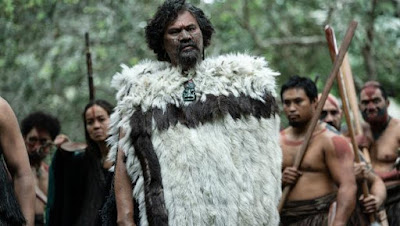A lay preacher's violent past is drawn into question and his faith tested as he becomes caught up in a bloody war between Maori tribes after arriving at a British settlement in the 1830s.
Lee Tamahori, known for the emotionally charged Once Were Warriors, directs The Convert, a film that ambitiously tackles themes of colonialism and Māori culture. While it aims to provide a thoughtful perspective on these subjects, the film struggles to meet the emotional and thematic depth of Tamahori's previous work.
The story follows Reverend Munro (Guy Pearce), a classic "white saviour" archetype with enlightened ideas and a steadfast moral compass. Munro's journey begins with a predictable premise: a "civilized" man intent on bringing righteousness and peace to the indigenous population. This character, while familiar, serves as a gateway into the narrative, albeit a somewhat clichéd one.
Upon arriving in New Zealand, Munro encounters Rangimai (Tioreore Ngatai-Melbourne), whose husband is brutally killed by a fearsome Māori leader. Munro decides to take Rangimai under his wing, attempting to treat her as an equal, which causes friction with the local population. The film initially suggests a storyline where Munro and Rangimai might unite against the colonial forces, but this expectation is subverted as the plot shifts to focus on a conflict between two Māori villages.
One of the film's significant shortcomings is its character development. Despite the strong performances by the cast, including a notable portrayal of Rangimai by Tioreore Ngatai-Melbourne, the characters lack the depth needed to fully engage the audience. Rangimai is depicted with emotional complexity as a grieving widow and a determined warrior, yet the film does not delve deeply enough into her character or her relationship with Munro.
Guy Pearce delivers an effective performance as Munro, but his character remains one-dimensional. The screenplay by Tamahori and Shane Danielsen touches on familiar tropes, such as forbidden love and the clash between "civilized" and "ritualized" violence, but fails to explore these themes with sufficient nuance.
One of the film's undeniable strengths is its stunning cinematography. Tamahori, along with cinematographer Gin Loane, captures the natural beauty of New Zealand with meticulous detail. The island's shimmering oceans, untamed jungles, and rugged landscapes are framed with care, creating a visually captivating backdrop for the story. However, at times, the film's polished visuals can feel more like a tourism advertisement than an authentic depiction of the setting.
The battle scenes, filmed with excitement and visceral impact, showcase a mix of muskets and traditional Māori weaponry. These sequences are visually striking, although the characters involved in these conflicts lack sufficient development, reducing the emotional stakes of the battles.
The Convert makes a commendable effort to depict Māori culture with authenticity. The film portrays Māori customs, rituals, costuming, weaponry, and facial markings with an obvious attention to detail. Tamahori's interest in Māori culture is evident, particularly in how the arrival of firearms and Christianity altered tribal conflicts.
A unique aspect of the film is its decision not to translate all Māori dialogue into English, leaving viewers to contextualize the interactions on their own. This choice adds an intriguing layer of mystery to the film and respects the authenticity of the Māori language.
Tamahori's film does not shy away from criticizing the British colonial impact on Māori life. The introduction of cannons and rifles by the English is shown to have exacerbated the violence among Māori tribes. The film presents a nuanced view of the Māori characters, even those engaged in brutal acts, providing them with dimensions often lacking in their British counterparts.
Despite this, the film sidesteps some of the more problematic aspects of the white-saviour narrative. While Munro attempts to intervene in the violent course of events, he ultimately does not become the saviour he envisions. The film conveys a balanced historical perspective, spiralling towards an inevitable violent climax.
The Convert is a visually stunning film with strong performances and a respectful depiction of Māori culture. However, it falls short in character development and narrative depth. The story meanders through familiar tropes without fully engaging the audience, resulting in a film that feels both ambitious and incomplete.
Tamahori's direction and Gin Loane's cinematography offer a beautiful portrayal of New Zealand's landscapes, but the film's thematic and emotional impact does not reach the heights of Once Were Warriors. The Convert is a mixed portrait of colonialism and cultural conflict, offering moments of insight and beauty but ultimately struggling to sustain its narrative and character arcs.
The Convert was released in NZ cinemas on March 14, 2024






